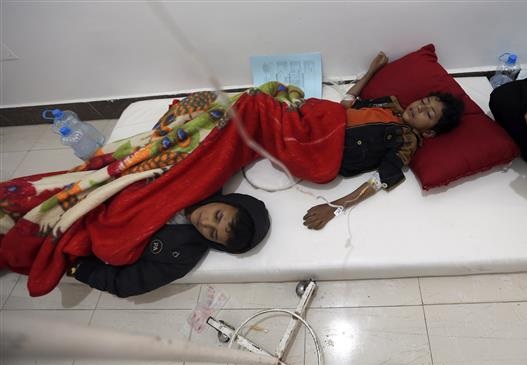
RNA - This comes as the EU itself is under mounting pressure from the international civil society to ban arms sales to Saudi Arabia in response to the Persian Gulf state’s bombing campaign in Yemen. For this, the leaders of four political groups in the European Parliament have urged the EU foreign policy chief, Federica Mogherini, to propose an EU arms embargo on Saudi Arabia, because of the devastating war on Yemen that has left nearly 20 million people in need of humanitarian aid.
The MEP leaders accuse the EU of flouting its own rules, by selling weapons to Saudi Arabia in defiance of a 2008 common code on military exports. Mogherini has the right to propose an arms embargo, but would need to win the backing of all EU member states, including the UK –which happens to be one of the biggest arms exporters to the Persian Gulf state.
Little wonder the latest call for a ban has run into immediate opposition from the British defence secretary, Michael Fallon, who has urged other EU member states not to criticise Saudi Arabia for its human rights violations and war crimes in the interests of major arms sales worth billions of dollars.
However, the EU code on arms exports lists eight grounds for turning down an arms export licence, including respect for the obligations of international organisations, such as the United Nations. In particular EU member states must show special caution and vigilance when issuing licences to Saudi Arabia where serious violations of human rights have been established by the UN and human rights groups.
Another problem is that just like the UK, the EU continues to sell arms to Saudi Arabia. In between, no one cares about common European values, much less a common position on arms sales, that says the EU shouldn’t sell arms and military gears to a country that doesn’t respect humanitarian law or human rights, including submarines, surface ships, aircraft, attack helicopters, armored vehicles and precision-guided munitions.
Mind you, France, followed by the UK, has just issued the most valuable arms-export licences to Saudi Arabia worth €16.9bn, according to the latest EU arms export report, which also shows that 17 EU member states sold arms to the Persian Gulf state.
As per international law, any such arms exports to Saudi Arabia are in direct violation of at least criterion two of the common position in regard to the country’s involvement in grave breaches of humanitarian law as established by competent UN authorities. True, the European Parliament passed a symbolic resolution in favor of an arms embargo in February 2016, but member states, which hold the levers of EU foreign policy, have so far ignored calls for action. The EU’s foreign policy chief, Federica Mogherini can put the issue on the agenda, but is reluctant to do so too. Worse still, the UK will no longer be bound by the EU’s arms export code after Brexit.
This is while the EU does not want disorder and turmoil on its southeastern flank. Wars in Syria, Iraq, and Afghanistan have produced mass migration into Europe and ISIL militants ready to hit the Continent. In this sense, the Yemeni conflict is a significant and immediate menace to European security.
It is time for the EU to keep human rights at the center of its foreign policy. European arms sales to Saudi Arabia and other Arab countries engaged in the Yemeni conflict have infringed the EU’s code on military exports. Under the bloc’s legislation, EU member states cannot transfer arms to countries that do not comply with humanitarian law and international rules. As well, weapons sales are forbidden if they pose a threat to regional peace, security, and stability.
Tragic enough, for some EU countries it seems that arms contracts with Saudi Arabia and other Middle Eastern cronies worth billions of dollars are more important than human rights and geopolitical stability in their own neighborhood. Instead of transforming itself into a military-industrial complex in conjunction with opportunities to continue the illegal war on the poorest nation in the Middle East, the EU could devise a common position on halting all arms exports to Saudi Arabia if they want to alleviate the humanitarian crisis, and to be credible in their promotion of humanitarian law and dialogue-based approach to conflict resolution in Yemen.
847/940